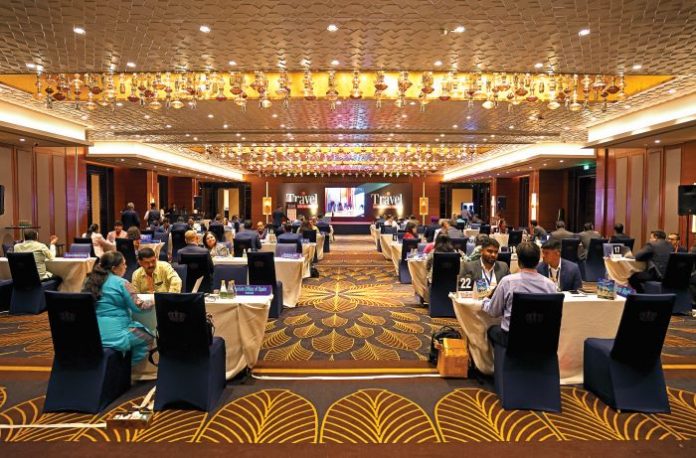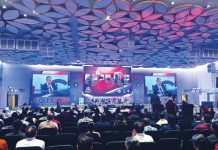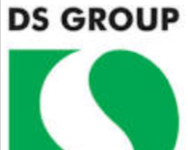Corporate travel is bouncing back in 2025, with Asia-Pacific destinations, cost efficiency, and integrated vendors leading the way. The trend towards technology and sustainability signals a smarter, more experience-driven future.
Janice Alyosius
MICEtalk’s exclusive Corporate MICE & Business Travel Survey 2025 gathered insights from Indian corporates across sectors, offering a comprehensive picture of how companies are approaching business travel and MICE in the year ahead. The findings reveal a market that is rebounding strongly, increasingly tech-aware, and is embracing sustainability, while factors, such as cost and connectivity continue to dominate decision-making.
Budget allocation
When asked what percentage of their travel budgets is allocated to MICE or group movements, 42.1 per cent of corporates reported allocating 25–50 per cent, while 34.2 per cent reported less than 25 per cent. Only 18.4 per cent of companies invested over 50 per cent, with a small segment (10.5 per cent) spending more than 75 per cent of their travel budgets on MICE. These figures indicated that while MICE remains a significant component of corporate travel, most companies are still carefully balancing expenditure against broader travel needs.
Travel volumes rising
The survey showed a clear recovery in corporate travel. Over 60 per cent of respondents reported increased business travel in 2025 compared to 2024, 23.7 per cent said volumes remained the same, and only 13.2 per cent reported
a reduction.
This rebound signals strong corporate confidence in resuming face-to-face interactions, meetings, and incentive travel, particularly after the disruptions of the past few years. Companies are prioritising in-person engagement for team building, networking, and strategic initiatives that require direct interaction.
factors impacting choices
For Indian corporates, the decision often rests on practicalities. Connectivity (79 per cent) and cost-effectiveness (76 per cent) emerged as the strongest factors, closely followed by unique experiences (55 per cent) and visa ease (53 per cent). While sustainability (16 per cent) ranked lower, its growing presence on the list suggests a gradual shift in mindset.
While practical considerations such as accessibility and budget dominate as major decision drivers, corporates are increasingly factoring in unique experiences and visa convenience.
Preferred MICE hubs
Domestic favourites include Goa (8 mentions), Udaipur (5), Jaipur, Bengaluru, Kerala, and Coorg. Heritage, leisure, and coastal destinations are top picks, reflecting a preference for locations that combine team engagement with a memorable setting. International choices are led by Dubai (6 mentions), Singapore (5), Thailand (3), Sri Lanka, Vietnam, and Türkiye, along with Europe, the UK, Japan, and Oman cited for executive-level events. The APAC region destinations dominate due to cost-effectiveness, proximity, and visa ease, while Europe is most sought-after for premium leadership-focused travel.
Vendor preferences
A clear majority of corporates (78.9 per cent) prefer working with a single integrated travel partner (TMC/DMC). Only 10.5 per cent use multiple local vendors, while 26.3 per cent manage travel internally. The preference for one-stop solutions highlights the importance of streamlined operations, consistent service delivery, and efficiency, particularly for the companies, which are managing multiple MICE activities across the regions.
Sustainability
Sustainability is becoming a key factor in corporate decision-making. More than 60 per cent of respondents said sustainability is important, 21.1 per cent considered it somewhat important. Only 15.8 per cent do not factor sustainability into their choices.
This paradigm shift indicates that eco-conscious planning is gaining traction, particularly for destinations, hotels, and vendors, which indicates that suppliers who integrate sustainable practices into offerings may gain a competitive edge.
Technology adoption
Technology adoption in corporate travel remains mixed. While 34 per cent are using virtual/hybrid platforms, 29 per cent rely on mobile event apps, and 26 per cent have started using AI-powered itinerary planning. At the same time, 32 per cent admitted that they are not using any travel tech tools. The gap shows that while early adopters are embracing smart solutions, a large segment is traditional in its approach. The substantial proportion of corporates are still relying on traditional methods, presenting opportunities for technology providers to expand their footprint.
Trends shaping 2025
Respondents highlighted several key trends expected to shape corporate travel and MICE this year:
- Visa facilitation and improved connectivity will stay in focus
- AI integration is expected to reduce internal planning workloads
- Demand for unique, luxury, and offbeat experiences is increasing
- Larger group sizes and growing CXO participation in international conferences are evident
- Cost-efficiency, safety, payment flexibility, and confidentiality remain key considerations
- Corporates anticipate a gradual increase in travel spend, aligned with broader economic trends
These insights underline a market balancing practical constraints with evolving expectations for personalised, technology-enhanced experiences.
The survey confirmed corporate travel in India is on a growth trajectory. Firms are travelling more, favouring APAC, prioritising integrated vendor partnerships, and gradually embracing sustainability and technology.
Connectivity (79%) and cost-effectiveness (76%) emerged as the strongest factors for corporate travel , closely followed by unique experiences (55%) and visa ease (53%)
While sustainability (16%) ranks lower, its growing presence on the list suggests a gradual shift in mindset













